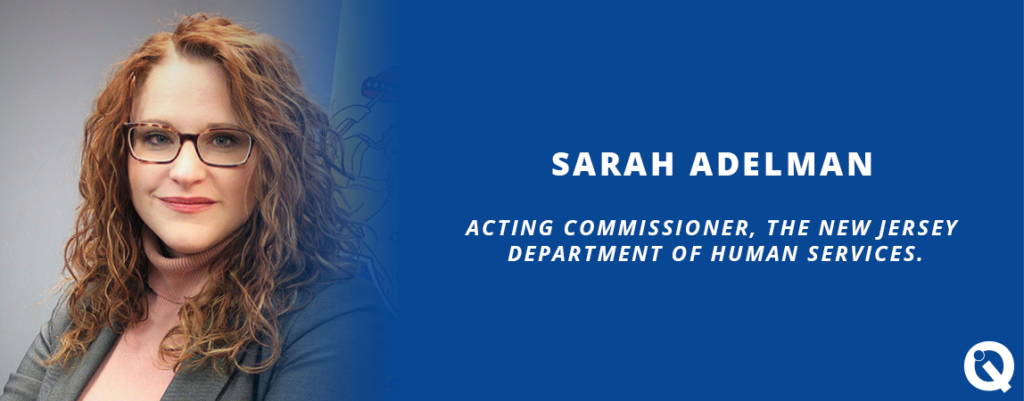Sarah Adelman serves as Acting Commissioner for the New Jersey Department of Human Services.
Most people want to remain in their home and community as they age. How is your department supporting the move toward home and community-based care for the older adults?
At Human Services, we’ve been focused on building a strong and person-centered home and community-based care system for a long time and well before the pandemic. In terms of Medicaid long-term care, in New Jersey we moved from 29 percent of our members living in the community for long-term services and supports in 2014 to more than 61 percent four years later. And that percentage continues to increase annually.
At the same time, between 2014 and 2019, the New Jersey population of older adults grew by more than 12 percent while the number of people in our nursing facilities declined by more than 5 percent. Our work here has been recognized across the country and last year we were recognized with the National SCAN Foundation Pacesetter Prize.
And we recently submitted a plan to the federal government to make a first time $50 million capital investment to help build housing units dedicated for Medicaid members at risk of institutionalization or homelessness, which we are hopeful will be approved.
Gov. Murphy’s administration has made significant investments to increase personal care assistant wages — from $16 an hour to $22 an hour — to expand and retain the care work force.
And, similarly, over that time we’ve invested more than $400 million in home and community-based services for individuals with intellectual and developmental disabilities to increase HCBS choices and wages for the workforce.
By 2030, the United States will be home to more seniors than school-aged children. So as part of the governor’s budget this year, we announced an initiative with AARP called Age-Friendly New Jersey, which will help support communities across our state to become more accessible and inclusive places to live at any age. These goals align with the work done by the Quality Institute’s Mayors Wellness Campaign.
Mental health services are in high demand and short supply in New Jersey and nationally, especially during the pandemic. What steps has the State and your department taken to better address this critical need?
The pandemic has obviously taken its toll on individuals’ emotional and mental health — and the services and supports we provide through human services have been more needed than ever. We’ve been able to secure more than $62 million in federal COVID funds to strengthen and expand services to individuals diagnosed with serious mental illness. We’re using the funding to enhance diversion efforts, crisis stabilization, and community integration efforts — with the goal of reducing visits to emergency departments and inpatient admissions. And we’re working to enhance outreach to increase access to community services. Also, we are funding ten new psychiatric residency slots to grow the pipeline of providers with experience treating the populations we serve.
The New Jersey State FY 2022 budget increased funding for maternity care through Medicaid. How will the state use these new funds to improve the quality of maternity care?
The budget continues to support the First Lady’s Nurture NJ work and in a whole-of-government approach, Governor Murphy’s administration is committed to improving maternal and infant health and reducing racial inequities in care and outcomes. The budget will fund the expansion of Medicaid coverage from 60 days to 365 days postpartum. It also invests $19 million to expand the supplemental prenatal program, which supports contraceptive and prenatal services for women of undocumented immigration status or women without access to health insurance. The budget also includes reimbursement for doula care. Complimenting on our work with the Quality Institute, the state no longer pays for non-medically indicated early elective deliveries. And we’re now requiring OB-GYNs, midwives and other health care professionals to complete a perinatal risk assessment of their patients to identify their health and social needs and refer them to services. These requirements are to improve outcomes for moms and babies and to create a healthier New Jersey for everyone.
How has your experience working for the Quality Institute early in your career influenced your work today?
At the time, we worked to expand New Jersey FamilyCare to cover more children and to make the application process shorter and easier for families. I am proud of that work. I feel those efforts are coming full circle now as the governor and I were able to announce at the beginning of the year our commitment to Cover All Kids. In our budget this year, we launched a path forward to really deliver on what I started working on at the Quality Institute years ago. We now have a path forward to provide health insurance for every child in New Jersey, regardless of immigration status and without barriers.
We like to learn about people beyond their work. Where might we find you on a day away from work?
I believe that self-care is incredibly important, especially for individuals whose work is in serving others. My husband and I love to sit on our front porch with coffee on the weekends and take walks together with our dog. And I love baking bread – I jumped on the pandemic sourdough bandwagon. I search for simple ways to center myself so I can stay focused on the critical work ahead.

